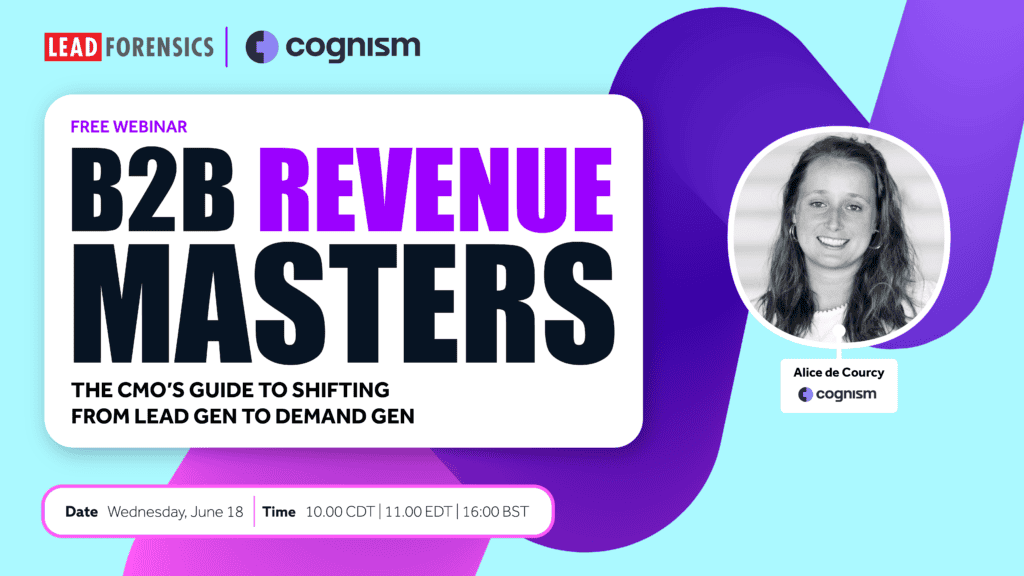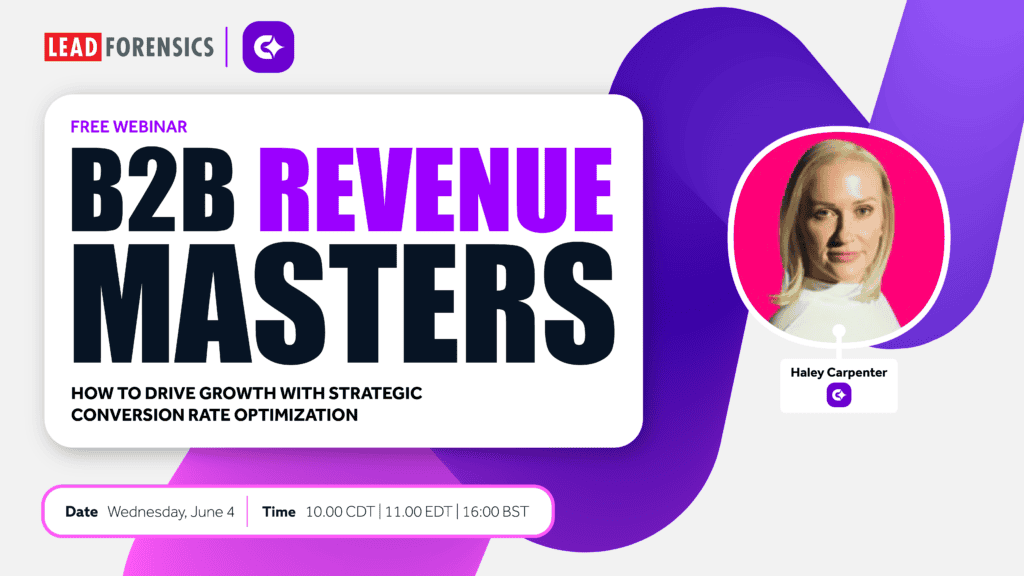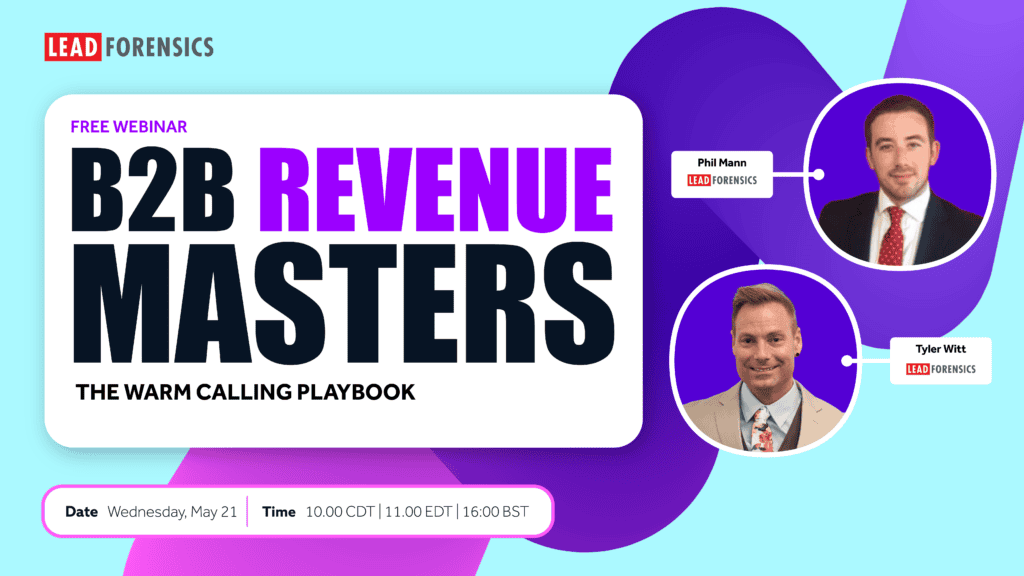The Key to Successful B2B Calls
This webinar features helpful insight for anyone looking to create better success with call-based sales methods. This session is packed with useful insights, from how your tone can make or break the start of a call to how you can control the conversation - even with a less-than-willing participant.
Webinar topic detail
The Key to Successful B2B Calls goes through four simple and useful areas that can change the way you and your sales teams view call-based sales campaigns. Great for beginners that have reservations about the effectiveness of cold-calling, or veteran salespeople looking to pick up some new tricks – at just 20 minutes, this webinar is a great place to start your learning on successful B2B sales calls.
Hello everyone and welcome to today’s Accelerate Business webinar: The Key to Successful B2B Calls. My name is Inah and I will be hosting today’s session.
Today, we will be going over
– Introduction to our topic
– Tonality
– Acting and perception
– Controlling the call
– Key takeaways
Our guest today is Jeremiah, who is a senior here at Lead Forensics. He is an expert in his field and he’ll be talking to you about essential tips for you to conduct a successful B2B sales call. So Jeremiah over to you.
Jeremiah: Well hello everyone and welcome today’s webinar. As you saw on the agenda we will run through some tips on how to establish authority, manage your tone and some techniques on how to get them on your side and advise on questioning.
Introduction
Now when calling prospects you need to sound professional and authoritative. You need to command their attention and more importantly get them to believe what you are saying. If you sound like a call centre representative you’ll obtain little or no information. This is because they get 100’s of all calls from lower level salespeople and simply filter them out of their day, it almost becomes an automatic response to filter out a sales call. For example, ‘he’s in a meeting, can I take a message’. Isn’t it amazing how many people are in a meeting at exactly the time you call. So you need to stand out and sound important. So let’s start working through how you can do this.
Tonality
When you’re making the telephone sales calls, the person at the other end of the telephone doesn’t know whether you’re wearing a suit and tie or sitting in your home office, sitting in your PJs. The only image that your sales prospect gets is transmitted through your voice. So preparing your voice and using it effectively is as important to telephone sales as having a regular shower in your face to face sales, although I have met some salesmen who haven’t even done that! So to stand out, command respect and more importantly to stop the gatekeeper’s automatic filtering response, you must establish authority from the outset. This is one of the most important aspects of telephone sales. What I mean by that is you must sound as if you are a director talking to a fellow director, a business owner talking to another business owner. So to do so you need to keep in mind your tonality.
Tonality has 5 times more impact than the words you use. It’s the 7, 38, 55 percent rule. You can see here that personal communication only takes spoken words into consideration only 7% of the time….minimal. Whereas, your tone and voice account for 38% of this. Now if we strip away body language because we are on the phone, it starts to reveal how important tone is going to be. So let’s run through some key tips on getting your tone right.
Your speaking voice consists of several qualities including rhythm, intonation and inflection, resulting in a one of a kind vocal personality that distinguishes someone like Morgan Freeman from David Beckham. This vocal fingerprint is your tone. Although your tone is what makes your voice yours you can optimise your phone communication by paying attention to it. Make sure your tone conveys the message you want it to. Now what I’m going to do is say the same sentence twice but I am going to say them slightly differently, I’m going to change my tone. On tone being a typical call centre salesperson and the other being more business like.
First, ‘I can help you drive more leads into your sales funnel and create tailored pitches to increase your success rate.’
And second, ‘I can help you drive…. more lead into your sales funnel…. and create tailored pitches…. to increase your success rate.’
So we’ve heard the difference tones can make. But how can you adjust your tone to hold attention on a call?
Don’t let your tone go up at the end of each sentence –
If it goes up you will sound like you are calling from a call centre and you will start to lose authority and importance. I mean, how many sales calls come from call centre operatives do we rate as highly important and I better listen? Not many, true? So you will begin to be judged as unimportant as will your call. You will struggle to gain any information, the respect of that person or even get that person on your side.
So let me give a couple of examples for you. One is a typical sales call and then the other is much more a business to business approach. It’s exactly the same wording, just delivered differently.
‘Hi it’s Jeremiah for David Jones, thank you’ (polite tone).
‘Hi, it’s Jeremiah for David Jones, thank you’ (assertive tone)
You need to keep your tone deep where possible. Police offices and newscasters keep a deep tonality because they are in a position of authority and therefore need to keep someone’s attention and command respect. One example I always use is, imagine you are at home and the phone rings, you pick it up and someone says ‘Hi, can I speak to Mr Jeremiah please’ in a typical cold call style, you begin to switch off instantly and say ‘I’m not interested thanks’ and hang up. But if they call and say ‘Hi, can I speak to Mr Jeremiah please’ in a more authoritative manner you are more likely to pay attention as you think it’s someone of authority.
Deep tonality really helps to establish authority. People in authority tend to have no ‘ums’, ‘basicallys’ or ‘obviouslys’ either. You won’t find them stuttering or having huge gaps in the conversation. You accept their authority.
A great tip is to mix up your pace. A lot of telephone salespeople are guilty of speedtalking. This could come down to enthusiasm, nervousness or a desire to get the sales points before the recipients hang up. You want to avoid this at all costs. It will just put people off. A great tip for anyone who is nervous on the phone or is new to sales, is that if you think you’re speaking too slow, you are probably perfect. But talking really slow can be just as bad, so you will have people wanting to finish your sentences for you. So moderate the pace of your speech, occasionally varying it for effect.
Let’s do another example for you. Again, the first in the typical cold call fashion and the second if more business-like.
‘So I’m guessing if I can show you at least 3 ways to increase your sales at no extra cost to your company, you want to see that, right?’
And the second example
‘So, I’m guessing that if I can show you …..at least 3 ways to increase your sales… at no extra cost to your company…..you’d want to see that, right?’
An easy way to sound more authoritative is to stand up, your voice carries more resonance, range and power when the diaphragm isn’t folded over. By standing you’ll sound a lot more self assured when speaking to prospects over the phone. Stand tall and observe the energy and the enthusiasm that comes through. Slump to your desk in a question mark curve and feel the conviction seep out of your voice.
Remember, motion causes emotion. So standing and being animated can really help on those all important calls. Being animated also really helps you with your confidence. I know when I was on the sales floor, I took all of my important calls standing up and I was very animated as this really helped with my confidence level and how I came across on the phone. If you can do all of this you’ll be able to keep your prospects’ attention through the tone you are using during your sales call.
Acting and Perception
As I said earlier, when you are on a sales call the person on the other end of the phone can’t see you and therefore can’t make a judgement based on the way you look. Someone will make a decision about you in the first 7 seconds of meeting you. So if you are meeting someone in person they could decide whether or not to trust you and if you’re worth paying attention to, almost instantly. When you are calling someone this is exactly the same, however they will be making their decision based on their perception of you that comes over the phone and not what they can see. They can’t make their own snap judgements on your appearance and demeanour. Instead they are going to make these judgements based on how you come across with your sound and tone. This is why so many people fall at the first hurdle and can’t get past the gatekeeper. They have listened to your tone and already come to a snap decision about you, deemed you unimportant and therefore you’re not getting put through to the decision maker. This is where perception comes in and it’s incredibly important that you build the perception someone has of you but how can you do this?
There is something called the ‘Act As if’ principle. This states that we can create outer circumstances by acting as if they are already there. For example, we can be happy by acting as if we are already happy……only we must really believe this. You can become a top seller by acting and displaying the mindset and characteristics of a top seller. You need to walk, talk and act like the most successful salesperson in the world, visualise it and become it. But what does that include, how does a successful salesperson act? Well, here are some pointers.
They display:
Empathy. Empathy is essentially the ability to identify with their prospects and customers, to feel what they are feeling and make them feel respected. This is not to be confused with sympathy. It’s more of an understanding of their concerns from an objective standpoint. If you show empathy you can gain trust and establish a rapport with your customer and it allows you to read customers, show concern and demonstrate an interest in providing a proper solution.
Focus. This is a big one for me. If you can manage your focus you will be successful. Keeping distractions in check is absolutely key for success in today’s world. You’ll find the successful person is the person who can stay focused on their task at hand. They will be much more successful than the person who keeps checking their phone, email or social media at work. So focus is a big one.
Optimism. This one may seem a little strange but essentially if you can stay optimistic, you’ll stay persistent and if you can stay persistent you will get those sales. Persistence is absolutely essential in sales. You can’t give up at the first sign of a ‘no’ or an objection. If you have optimism then you have persistence.
Great Listeners. If you can’t listen, you won’t be successful. As a salesperson you need to listen to their needs, their objections and you need to work from these and tailor each pitch to the individual. If you can’t do this, you’ll end up sounding like any other average salesperson. By listening you can become empathetic and you are more likely to handle any of their objections and win that sale.
Accountable. A great salesperson needs to be able to accept full responsibility for their actions and their results. No-one else is going to get them for them. They do what is necessary to achieve their goals and they don’t blame objections, managers, data or external problems. They look at what went wrong and learn from it.
A great little tip to feed your mind is remember you are either winning or you’re learning. There is no failure.
So the key thing to remember about this section is, that it all boils down to the perception that the person who you are talking to has of you. A good way to test this is to listen to your own calls. Do you sound like someone in charge? Or do you sound weak and like any average sales caller? If you can picture sounding like the millionaire owner of a million dollar business you can establish that authority on the call.
So let’s put this into another perspective for you. So generally, a lot of people follow the Do>Have>Be mentality. If I do what I need to do, I’ll get what I want to have, then I can be the person I’ve always dreamed of being. However, the Act As If principle is telling you Be>Do>Have. Be the person who you would be if you already had achieved your goal, then you will do the things that a successful person would do, which will allow you to have exactly what you want. So think, Be>Do>Have, instead of Do>Have>Be.
Controlling the call
So an incredibly key way to make sure you achieve authority on your call and you’re going to be listened to, is to make sure you are controlling the call from the start. The minute you pick up the phone you want it to be your call and it needs to stay that way until you hang up the phone. It starts with the gatekeeper and ends with the decision maker. But how can you keep that control?
There is something I call the Triple A Technique. This stands for ‘answer and ask’. This is one of the main key aspects of keeping control of the call. When someone throws you an objection or asks you a question, answer the objection or question and then ask an open ended question back to regain control of that call. So here’s what this could sound like.
“Hi Jeremiah, you’re through to Inah.”
“Hi Inah, I’m calling from a company called Total Leads. We’re a telemarketing agency that would really help drive your lead generation.”
“Sorry but I’m just not interested.”
I understand your quick reaction there Inah because many people I’ve spoken to had the same initial reaction. However, when they found out what we could offer them they have now become our best buyers. How do you generate new business at the moment?
What you will notice is that I finish with a question and that is key. As a general rule of thumb, the person asking questions is the one in control of the call. It’s vital that you use open questions because this will help your customer open up to you and give more reasons why they need your product or service. Whereas closed questions will only give you a ‘yes’ or ‘no’ answer. This will put you under pressure as the ball is fired straight back at you and you are potentially starting to lose control already. What you don’t want to do is answer the objection and finish or pause waiting for their response. Chances are they will fire back another objection or brush you off, you are also putting the power back in their hands. So keep it in yours by keeping the conversation going and asking that open ended question. So let’s hear that example again, this time without the question at the end.
“Sorry but I’m just not interested.”
“Okay Inah, I totally get your quick reaction because many people I have spoken to had the same initial reaction. However they found out what we could offer them and they’ve now become one of our best buyers”.
“Sorry but I just don’t think you can add anything else to our company. Thank you anyway.”
The control has gone and moved into the prospects hands. It’s then going to be very difficult to get it back but by putting that question on the end you keep that control. This is also a really great way of getting conversations back on track. If you find it’s going down the route of multiple objections and refusals, use the Triple A method to bring the conversation back around to you and your product or service. So let’s hear how that might sound.
“Okay Inah, so based on our previous conversations and the quote I sent over, are you happy to go ahead with the deal?”
“Actually Jeremiah, no. I think you are too expensive compared to some of your competitors who do the same exact thing.”
“Well Inah, I completely understand your concern and point of view. We have a few competitors on the market and I believe they have different packages available. It’s maybe that it’s not quite a like-for-like comparison, can I ask what you are comparing our prices to and what’s included?”
So in this example they weren’t impressed with the price and had alternative quotes from competitors. I empathised with them, answered their concern and then asked an open-ended question to try and get control back so I could try and convince them that we are the best solution for them.
Key Takeaways
So we are almost at the end of the webinar. I would like to quickly run through the key takeaways from today’s webinar. So just to recap.
The first thing you need to take into account and control is your tone. As we saw earlier your voice and tone has 5 times more impact than the words you actually use. You need to follow the tips we mentioned earlier, don’t let the tone go up at the end, keep a deep tone where possible, mix up the pace and stand up and get animated on those important calls. All of these will help you sound more authoritative.
Secondly, remember the ‘Act As If’ principle. If you act like the top salesperson, you’ll become the top salesperson. Take into account the personality traits that make this up and embody them. This will help you be perceived as someone of importance and worth listening to, which in turn will get you more success.
Lastly but by no means least, implement the ‘Triple A’ technique. This will help you keep control of the sales conversation. If they throw you an objection, answer it and then throw them an open question steering the conversation right where you want it to go.
We have come to the end of our webinar and we really hope that you will all takeaway some useful tips.
Just to give you some more information about what Lead Forensics can do for your business. Lead Forensics can identify the businesses that are hitting your website. Industry averages that 98% of visitors that are hitting your website will never inquire but Lead Forensics can tell you who those companies are.
Our tool gives you the contact information, including email addresses and telephone numbers of the key decision makers at the company. We’ll ensure that you have fuel for your sales pipeline and gain tangible ROI. Some of the features Lead Forensics provides are:
– Company name
– Email address
– Telephone number
– Website address
– How they found you
– How long they spent browsing your site
– And the pages they viewed
As an attendee of this webinar Lead Forensics is offering you a free trial of our software. We will show you a quick demo on how the tool works and set it up on your website completely free for 2 weeks and you have no obligation. That’s it from me.
– No obligation, 2 week free trial of Lead Forensics
– See the information available from your business website
– 10 minutes to set up
– Complimentary demonstration of features with one our experiences team members
– Turbo-charge your sales pipeline!
So as Jeremiah mentions if you are interested in taking up this offer from Lead Forensics, please do take the opportunity to let us know at www.leadforensics.com/contact/
Well thank you, Jeremiah, for sharing your knowledge with us and thank you to our attendants for joining. We hope to see you on one of our next Accelerate Business webinars.
Recent Webinars

Marketing
The CMO's Guide to Shifting from Lead Gen to Demand Gen
Still chasing MQLs that don’t convert? It’s time to break the cycle…
Join us for an exclusive webinar with Alice de Courcy, Group CMO at Cognism ...

Marketing
How To Drive Growth With Strategic Conversion Rate Optimization
Most marketing teams are doing CRO wrong. Don’t be one of them.
CRO isn’t about tweaking buttons or chasing 'quick wins'. It’s about building a ...

Sales
The Warm Calling Playbook
Warm calling is fast becoming the go-to strategy for teams that want to have more relevant, better-timed conversations. But what actually makes a call ‘warm’? And how can reps confidently ...
Read more5Key Speakers
Jeremiah Nyarko
Sales Leader
Lead Forensics



